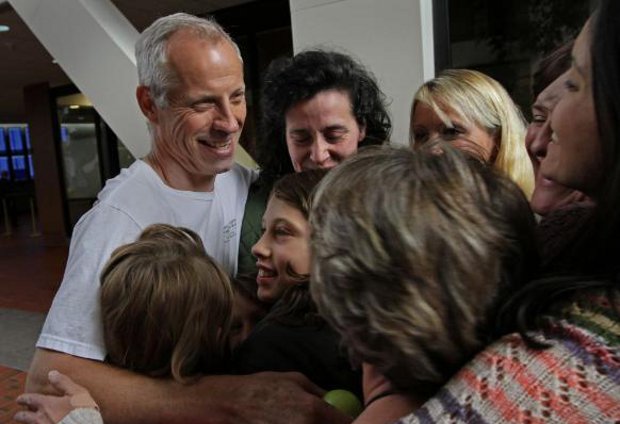|
|||||||
HIGHLIGHTS FROM 2012
Photo: Bruce Bisping, Star Tribune – Alvin Schlangen gets group hug

Highlights at a glance:
Schlangen Acquitted
Minnesota farmer found not guilty on all three charges by a jury; still facing charges in Stearns County.
Shady Grove Farm Protected
Michigan Right to Farm Act
upheld by judge in Forsyth
v. Buchler case.
Bechards’ Favorable Settlement
Missouri State Milk Board lets
Bechards continue raw milk
deliveries.
Herdshare Victory in Wyoming
Proposed regulatory ban
becomes herdshare sanction.
Jury Acquits Alvin Schlangen in Minnesota
Fund member Alvin Schlangen is an organic egg farmer in Freeport, Minnesota, who serves as a volunteer manager for the private food buyers club, Freedom Farms Coop, delivering raw milk and other nutrient-dense foods to club members in the Twin Cities area. The Minnesota Department of Agriculture (MDA) raided Alvin’s operation several times in 2010 and 2011, seizing and embargoing thousands of dollars’ worth of food. MDA then had the Hennepin County District Attorney bring criminal charges against Alvin for alleged violations of the state food and dairy code.
On September 20, 2012 the jury found the courageous farmer not guilty on all three charges against him—a victory galvanizing the food rights movement with the jury’s refusal to convict someone helping others exercise their freedom of food choice. The court was packed throughout the three-day trial with club members attending in support of Alvin. Nathan Hansen, a member of the Fund’s growing attorney network, represented Alvin in the case.
The Fund continues to represent Alvin. The district attorney in Stearns County has filed six criminal charges against Alvin for alleged violations of the Minnesota food and dairy code, three of which are the same he faced in Hennepin County. In addition, MDA is seeking to shut down Alvin’s delivery of food to club members in an administrative proceeding. Nathan Hansen has been retained again to represent the farmer in the criminal case and is serving as co-counsel to Fund General Counsel Gary Cox in the administrative case.
Right to Farm Act Protects Shady Grove Farm
Zoning barriers pose a challenge to farmers all over the country, but there are potential solutions. Randy and Libby Buchler of Shady Grove Farm raise poultry and livestock on land zoned “non-agricultural” in Forsyth Township, Michigan, selling their eggs and wool locally. The Township sued the Buchlers in Marquette County Circuit Court to prevent them from farming on their property.
The Fund retained local attorney Michelle Halley of Marquette to represent the Buchlers, and Fund Board Member and attorney Steve Bemis served as co-counsel in the case. The Michigan Right to Farm Act protects farming on land zoned non-agricultural unless the township obtains a waiver from the Michigan Department of Agriculture and Rural Affairs, which Forsyth Township had not.
On December 18, 2012, Judge Thomas L. Solka ruled in favor of the Buchlers, holding that “because defendant’s farm…is protected from nuisance suits under the Right to Farm Act plaintiffs’ request for an injunction closing the farm is denied.”
One Fund member summed up the importance of the victory by saying,
-
The Buchler story is extremely heartening. Small, clean, diversified, essentially “neighborhood” farms are THE proper solution to the food crises in America and elsewhere. Such farms are good for people (they produce healthful food, guard against shortages, stabilize local economies, and instill neighborliness), and for the environment (by helping maintain micro- and macro-biologic diversity).
The Fund is also currently representing members Christian and Lena Zook in a Right to Farm case in Pennsylvania. Each state’s Right to Farm law is different, and the Fund is working to make sure that every available protection is respected.
Missouri State Milk Board Settles with Bechards
Armand and Teddi Bechard produce raw milk on their farm in Missouri; state statute legalizes the unlicensed sale on the farm and through delivery. On two occasions in the spring of 2009, undercover agents from the Springfield-Greene County Health Department purchased raw milk produced by the farm at one of the Bechards’ delivery points, a health food store parking lot in Springfield.
The Missouri State Milk Board and State Attorney General then filed suit against the Bechards to enjoin them from delivering raw milk to a central distribution point in Springfield, seeking to limit them to making deliveries only to the residences of individual customers. Granting the injunction would have hurt the Bechards’ business because many of the farm’s customers only wanted to pick up the milk at a central distribution point. It would have also set a precedent that could reduce consumers’ access to raw milk from other farms in Missouri.
Nearly three years after the start of the case, Fund General Counsel Gary Cox was able to negotiate a successful resolution. On July 31, 2012, the Bechards entered into a settlement agreement with the Missouri State Milk Board under which the Bechards can deliver to a central distribution point and are able to carry on their business as they have in the past. For a perspective on the case as told by the Bechards’ daughter, Katie, read “Raw Milk Right of Passage”.
Herdshares Prevail in Wyoming
Fund members, State Representative Sue Wallis and her brother, rancher Frank Wallis, were successful in getting the legality of herdshares codified by regulation in Wyoming. Last spring the Wyoming Department of Agriculture (WDA) initially tried to institute a ban on shared ownership of dairy animals by issuing a proposed regulation stating that the state law prohibiting the sale of raw milk “does not apply to individuals who obtain milk from animals solely owned by them, members of their family or their employer and who furnish raw milk or products made from raw milk only to members of their family or nonpaying guests” [italics added].
Opponents of the proposed regulations fought for the removal of the word “solely” and, after a comment period and several hearings around the state, the WDA issued a press release in September notifying the public that the final rule had the word “solely” removed. The rule went into effect in December 2012. The efforts of the Wallises and others turned a potential crisis into an affirmation of Wyoming citizens’ rights.
There were a number of other significant cases with which the Fund has been involved over the past year. Next is a brief review of some of them.
